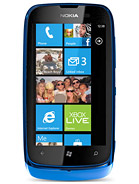
Updated: We've taken another look at the Lumia 610, with a new price drop making it much cheaper - but does it make it better than the still-cheaper Nokia Lumia 710?
The Nokia Lumia 610 has placed itself squarely at the low end of the smartphone market, with just 256MB of RAM and a single-core 800MHz processor
Alongside the new stripped down Windows Phone Tango operating system and a new, more wallet-friendly UK price tag of only around £125 on Pay as you go, or free on contracts starting from just £13 per month.
This oddly puts it at a higher price than the better-specified Nokia Lumia 710 - we're not sure what's going on here, especially in the UK market.
Although the Nokia Lumia 610 is broadly competing with every other low spec and low price handset, its real competition will come from other Windows Phone Tango handsets, such as the ZTE Tania. It remains to be seen how they'll fare, since the Nokia Lumia 610 has beaten them to market, so as a pioneer of the new budget-conscious operating system, how does the Nokia Lumia 610 stack up?

Based on physical impressions, it isn't likely to stand out in a crowd, with a plastic body and a dinky 3.7-inch 800 x 480 TFT screen. The sides have a metallic gleam to them but it's never likely to be mistaken for real metal, and the illusion is lost altogether once you actually hold the phone, which feels plastic through and through.





We can't help but feel that having the power button opposite the volume rocker and moving the camera button slightly further up the body of the phone would have worked better, as it requires some thumb movement to turn the phone on when held naturally in the hand.

In addition, the Nokia Lumia 610 has soft key buttons just below the screen for home, back and search. These are intuitive and feature pictures of each function, making their use obvious even to someone who's never used the phone before.

The ports, meanwhile, all sit along the top of the phone, with a 3.5mm headphone socket in the centre, and a micro USB connector on the right. There's also a wrist strap hole on the top-left, while the microphone sits alone at the bottom of the phone.

There's no microSD card slot, which is especially disappointing given the paltry 8GB of internal storage. The battery cover requires a slide down from the main chassis to remove - something that can be hard for those used to popping a backplate off.



Full Spesifications's For Nokia Lumia 610
| General | 2G Network | GSM 850 / 900 / 1800 / 1900 |
| 3G Network | HSDPA 850 / 900 / 1900 / 2100 | |
| SIM | Micro-SIM | |
| Announced | 2012, February | |
| Status | Available. Released 2012, April | |
| Body | Dimensions | 119 x 62 x 12 mm, 77.6 cc (4.69 x 2.44 x 0.47 in) |
| Weight | 131.5 g (4.62 oz) | |
| Display | Type | TFT capacitive touchscreen, 65K colors |
| Size | 480 x 800 pixels, 3.7 inches (~252 ppi pixel density) | |
| Multitouch | Yes | |
| Sound | Alert types | Vibration; MP3, WAV ringtones |
| Loudspeaker | Yes | |
| 3.5mm jack | Yes | |
| Memory | Card slot | No |
| Internal | 8 GB storage, 256 MB RAM | |
| Data | GPRS | Class 10 (4+1/3+2 slots), 32 - 48 kbps |
| EDGE | Class 10, 236.8 kbps | |
| Speed | HSDPA, 7.2 Mbps; HSUPA, 5.76 Mbps | |
| WLAN | Wi-Fi 802.11 b/g/n | |
| Bluetooth | Yes, v2.1 with A2DP, EDR | |
| USB | Yes, microUSB v2.0 | |
| Camera | Primary | 5 MP, 2592х1944 pixels, autofocus, LED flash, check quality |
| Features | Geo-tagging, face detection | |
| Video | Yes, VGA@30fps | |
| Secondary | No | |
| Features | OS | Microsoft Windows Phone 7.5 Mango |
| Chipset | Qualcomm MSM7227A Snapdragon | |
| CPU | 800 MHz ARM Cortex-A5 | |
| GPU | Adreno 200 | |
| Sensors | Accelerometer, proximity, compass | |
| Messaging | SMS (threaded view), MMS, Email, Push Email, IM | |
| Browser | HTML5 | |
| Radio | Stereo FM radio with RDS | |
| GPS | Yes, with A-GPS support | |
| Java | No | |
| Colors | White, Cyan, Magenta, Black | |
| - SNS integration | ||
| - Active noise cancellation with dedicated mic | ||
| - MP3/WAV/eAAC+/WMA player | ||
| - MP4/H.264/H.263/WMV player | ||
| - Document viewer | ||
| - Video/photo editor | ||
| - Voice memo/dial | ||
| - Predictive text input | ||
| Battery | Li-Ion 1300 mAh battery (BP-3L) | |
| Stand-by | Up to 670 h (2G) / Up to 720 h (3G) | |
| Talk time | Up to 10 h 30 min (2G) / Up to 9 h 30 min (3G) | |
| Music play | Up to 35 h | |
| Misc | SAR US | 1.32 W/kg (head) 0.97 W/kg (body) |
| SAR EU | 0.83 W/kg (head) | |







0 comments:
Post a Comment